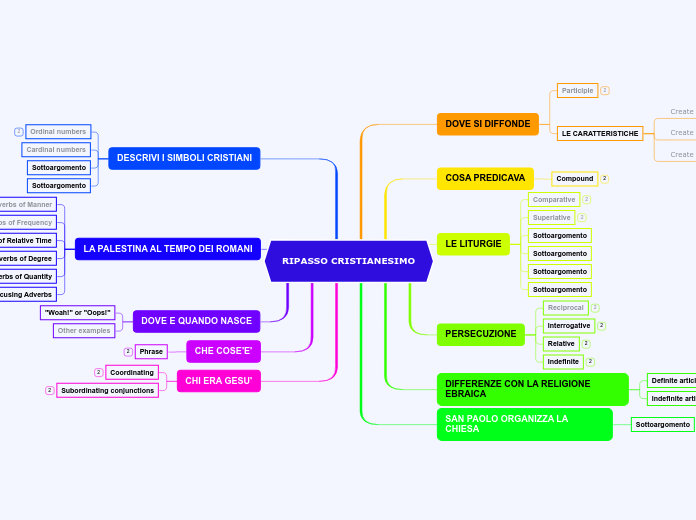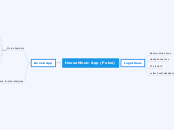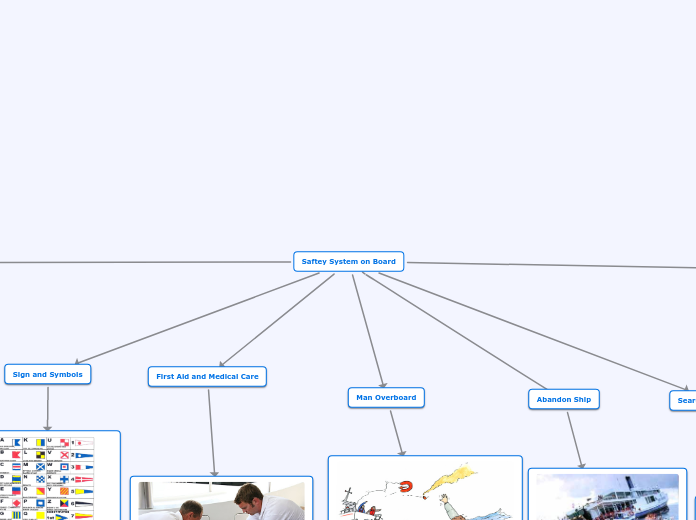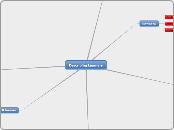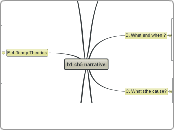RIPASSO CRISTIANESIMO
The part of speech is a category to which a word is assigned according to its syntactic functions. In English the main parts of speech are noun, pronoun, adjective, determiner, verb, adverb, preposition, conjunction, and interjection.
CHI ERA GESU'
A conjunction is a word like 'if' 'but' or 'and' which is used to connect sentences or clauses together.
Subordinating conjunctions
Subordinating conjunctions are conjunctions that are used at the beginning of subordinate clauses. Some examples of these conjunctions are: although, after, before, because, how, if, once, since, so that, until, unless, when etc.
Although it was raining, I went out.
Coordinating
Coordinating conjunctions always connect phrases, words, and clauses. They are: for, and, nor, but, or, yet, so.
This stew is savory and delicious.
CHE COSE'E'
A preposition is one of the most exciting parts of grammar. A preposition is used to describe the location of something in relation to something else.
Phrase
A group of words used with the force of a single preposition is called phrase preposition.
according to, by means of, owing to, with a view to, in place of, in front of, etc.
DOVE E QUANDO NASCE
An interjection is used to express emotion in a sentence.
Think of other interjections!
Other examples
"Woah!" or "Oops!"
LA PALESTINA AL TEMPO DEI ROMANI
An adverb is used to describe a verb, but it can also describe an adjective or another adverb.
Adverbs normally help paint a fuller picture by describing how something happens.
Focusing Adverbs
Especially, Specifically, Merely, Either
Adverbs of Quantity
A lot, Little, Much
Adverbs of Degree
The intensifiers strengthen adverbs adjectives and adverbs and down- toners make them weaker.
down-toners
Fairly, Rather
intensifiers
Extremely, Very
Adverbs of Relative Time
Just, Afterward, Soon, Currently
Adverbs of Frequency
Always, usually, Never
Adverbs of Manner
Carefully, Slowly
DESCRIVI I SIMBOLI CRISTIANI
A numeral is a word or phrase that describes a numerical quantity.
Some theories of grammar use the word 'numeral' to refer to cardinal numbers that act as a determiner to specify the quantity of a noun, for example the 'two' in 'two hats'.
Cardinal numbers
Ordinal numbers
First, second..
SAN PAOLO ORGANIZZA LA CHIESA
DIFFERENZE CON LA RELIGIONE EBRAICA
An article is a word used to modify a noun, which is a person, place, object, or idea. Technically, an article is an adjective, which is any word that modifies a noun.
Indefinite article
Indefinite articles are the words 'a' and 'an.' Each of these articles is used to refer to a noun, but the noun being referred to is not a specific person, place, object, or idea. It can be any noun from a group of nouns.
A car in the parking lot.
Definite article
It refers directly to a specific noun or groups of nouns.
The breakfast on my plate.
PERSECUZIONE
A pronoun is a word that can be used in place of a noun, typically after the noun itself has already been stated.
Indefinite
Unlike demonstrative pronouns, which point out specific items, indefinite pronouns are used for non-specific things. This is the largest group of pronouns. All, some, any, several, anyone, nobody, each, both, few, either, none, one, and no one are the most common.
None, Several
Relative
Relative pronouns are used to add more information to a sentence. Which, that, who (including whom and whose), and where are all relative pronouns.
Which, Where
Interrogative
Interrogative pronouns are used in questions. Although they are classified as pronouns, it is not easy to see how they replace nouns. Who, which, what, where, and how are all interrogative pronouns.
Which, Who
Reciprocal
Reciprocal pronouns are used for actions or feelings that are reciprocated. The reciprocal pronouns are each other and one another.
Each other, one another
LE LITURGIE
An adjective is a word that's used to describe a specific noun and to provide more detail to the listener.
Sottoargomento
Superlative
Superlative adjectives demonstrate a higher level of comparison between entities.
She is the prettiest princess.
Comparative
Expresses a comparison between two entities or groups of entities in quality or degree.
He is taller than she is.
COSA PREDICAVA
A noun is defined as a person, place, thing or idea. Proper nouns always begin with a capital letter. Common nouns, which are general words, such as 'cars,' are not capitalized.
Compound
Compound nouns are words where two nouns have been stuck together to make a new noun. Compound nouns should be written as one word, without a hyphen.
Candlestick
DOVE SI DIFFONDE
A verb is an action word or 'doing' word that signifies movement in some way.
LE CARATTERISTICHE
An auxiliary verb helps the main (full) verb and is also called a 'helping verb.' With auxiliary verbs, you can write sentences in different tenses, moods, or voices.
Participle
A participle is a verb form that can be used as an adjective or to create a verb tense. There are two types of participles: Present participle (ending -ing) and Past participle (usually ending -ed, -d, -t, -en, or -n).
Create sentences
The winning athlete gets a trophy.
